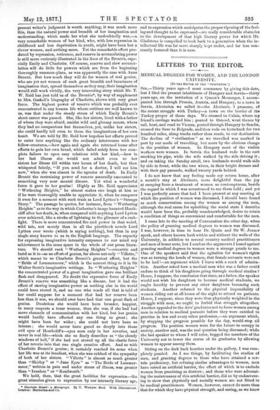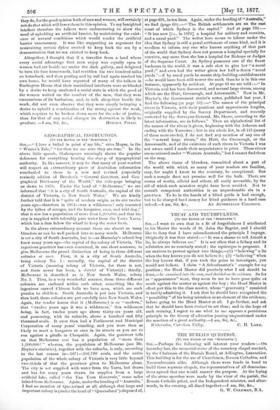LETTERS TO THE EDITOR.
MEDICAL DEGREES FOR WOMEN, AND THE LONDON UNIVERSITY.
[TO THE EDITOR OF THE SPECTATOR:1 SIR, —Thirty years ago—I must commence by giving this date, lest I libel the present inhabitants of Hungary and Servia—thirty years ago, on the invitation of a Queen's Messenger, I accom- panied him through Prussia, Austria, and Hungary, to a town in Servia, Alexinitza we called it—the Alexinatz, I presume, of the recent struggle with Turkey—a town on the border of the Turkey proper of those days. We crossed to Calais, where my friend's carriage waited him ; posted to Ostend, went thence by rail, boat, and road to Vienna, posted through Hungary to Semlin, crossed the Save to Belgrade, and then rode on horseback for two hundred miles, along tracks rather than roads, to our destination. The decline of " civilisation " as we travelled was marked in part by our mode of travelling, but more by the obvious change in the position of women. In Hungary most of the visible workers were women. In Servia the husband rode in the cart smoking his pipe, while the wife walked by the side driving it ; and on taking the Sunday stroll, two husbands would walk side by side in front, while the two wives, in their bright dresses and with their gay parasols, walked twenty yards behind.
I do not know that any feeling made my return home, after a month's stay at Alexinatz, more delightful than the joy at escaping from a treatment of women so contemptuous, beside the regard in which I was accustomed to see them held ; and yet I was perfectly aware that had I been present at any meeting at which the position of women was discussed, I should have found as much conservatism among the women as among the men, although the real cause for upholding the social state I describe would have been the, probably unacknowledged, desire to retain a condition of things so convenient and comfortable for the men.
I came late to the meeting of Convocation the other day, when the policy of granting medical degrees to women was discussed. I was, however, in time to hear Dr. Quain and Sir W. Jenner speak, and others known both within and without the walls of the University, in addition to several country medical practitioners and men of lesser note, but I confess the arguments I heard against granting medical degrees to women were a strange puzzle to me. One of the speakers said that the agitation for women's rights was so turning the heads of women, that female servants were not to be had !—an argument which I leave with a mark of admira- tion. Another asked how a medical man who was a father could endure to think of his daughters going through medical studies ? Hence, I suppose, the conclusion that since, as a father, the speaker would not wish his daughters to become medical students, we ought forcibly to prevent any other daughters becoming such students. Another referred to the physical impossibility of women riding out at all hours of the night to attend on patients. Hence, I suppose, since they were thus physically weighted in the struggle with men, we ought to forbid that struggle altogether. Another appealed to the Arts' graduates not to force women among men in relation to medical pursuits before they were entitled to practise in law and every other profession,—an argument which, by stopping the progress possible for the day, would stop all progress. The position women were for the future to occupy in society, another said, was the real question being discussed; while the last speaker to whom I will refer, begged the members of the University not to lower the status of its graduates by allowing women to appear among them.
Sitting on the dark back benches under the gallery, I was com- pletely puzzled. As I see things, by facilitating the studies of men, and granting degrees to those who have attained a cer- tain proficiency, but refusing similar advantages to women, men have raised an artificial barrier, the effect of which is to exclude women from practising as doctors ; and those who were advocat- ing the maintenance of this artificial barrier, did so by endeavour- ing to show that physically and socially women are not fitted to be medical practitioners. Women, however, cannot do more than that for which they have physical strength, and caring, as we know
they do, for the good opinion both of men and women, will certainly not do that which will lower them in this opinion. To my benighted intellect therefore the talkers were endeavouring to show the need of upholding an artificial barrier, by maintaining the exist- ence of natural conditions which would render the artificial barrier unnecessary. It was like supporting an argument for maintaining certain dykes erected to keep back the sea by a demonstration that no sea existed to keep back.
Altogether, I thought that if a traveller from a land where every social advantage that men enjoy was equally open to women had sat beside me under the dark gallery, and delighted .to•turn his face homewards, had reridden his two hundred miles on horseback, and then posting and by rail bad again reached his own home, he would have reported of many of the talkers in Burlington House that their uncivilised intellects were so blinded by a desire to keep unaltered a social state in which the good of the women waited on the comfort of the men, that they were 'unconscious of its barbarism, and, in talk altogether beside the mark, did not even observe that they were simply betraying a desire to uphold a combination of the strong against the weak, which requires to be broken down more for the sake of justice, than for that of any social changes its destruction is likely to



































 Previous page
Previous page